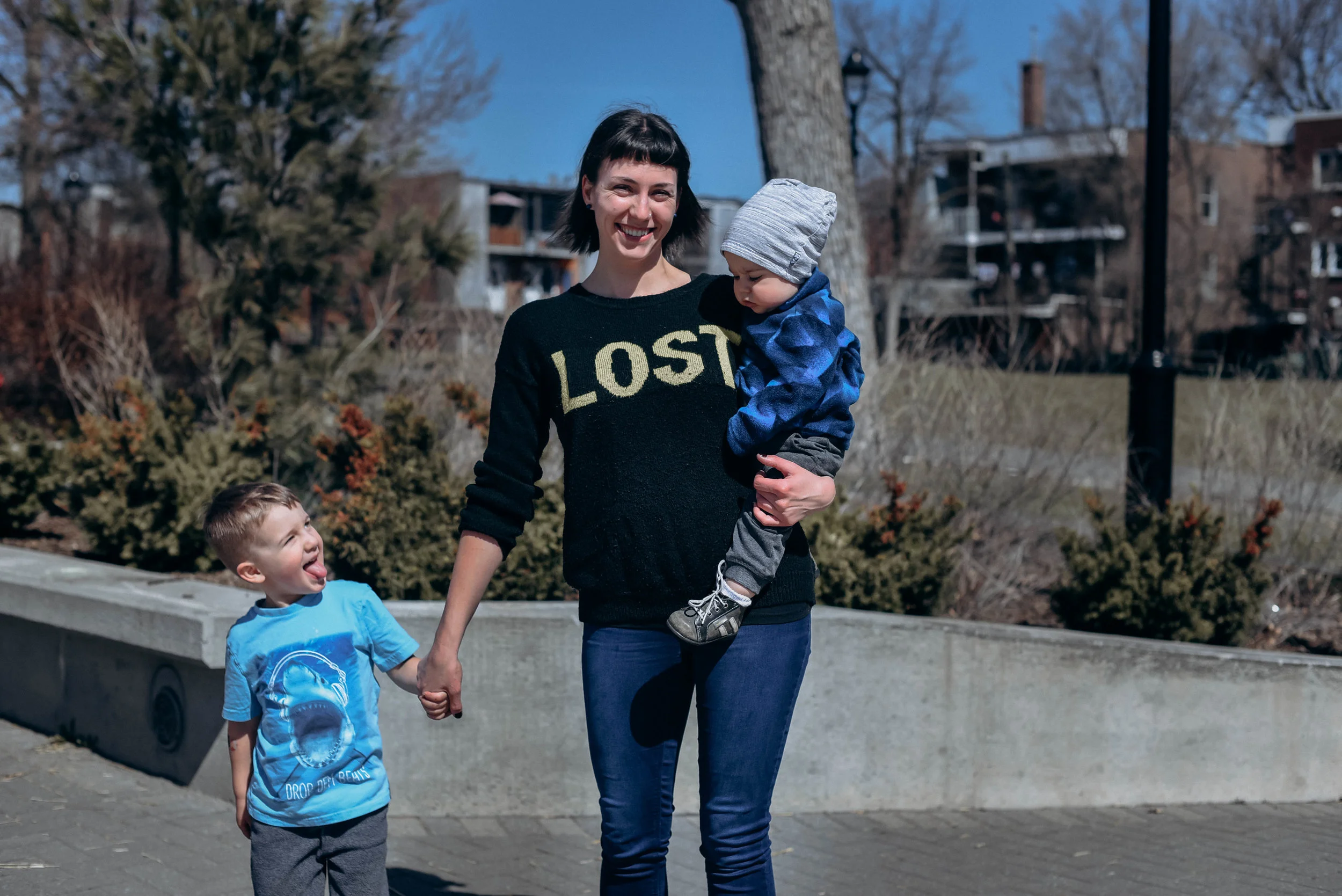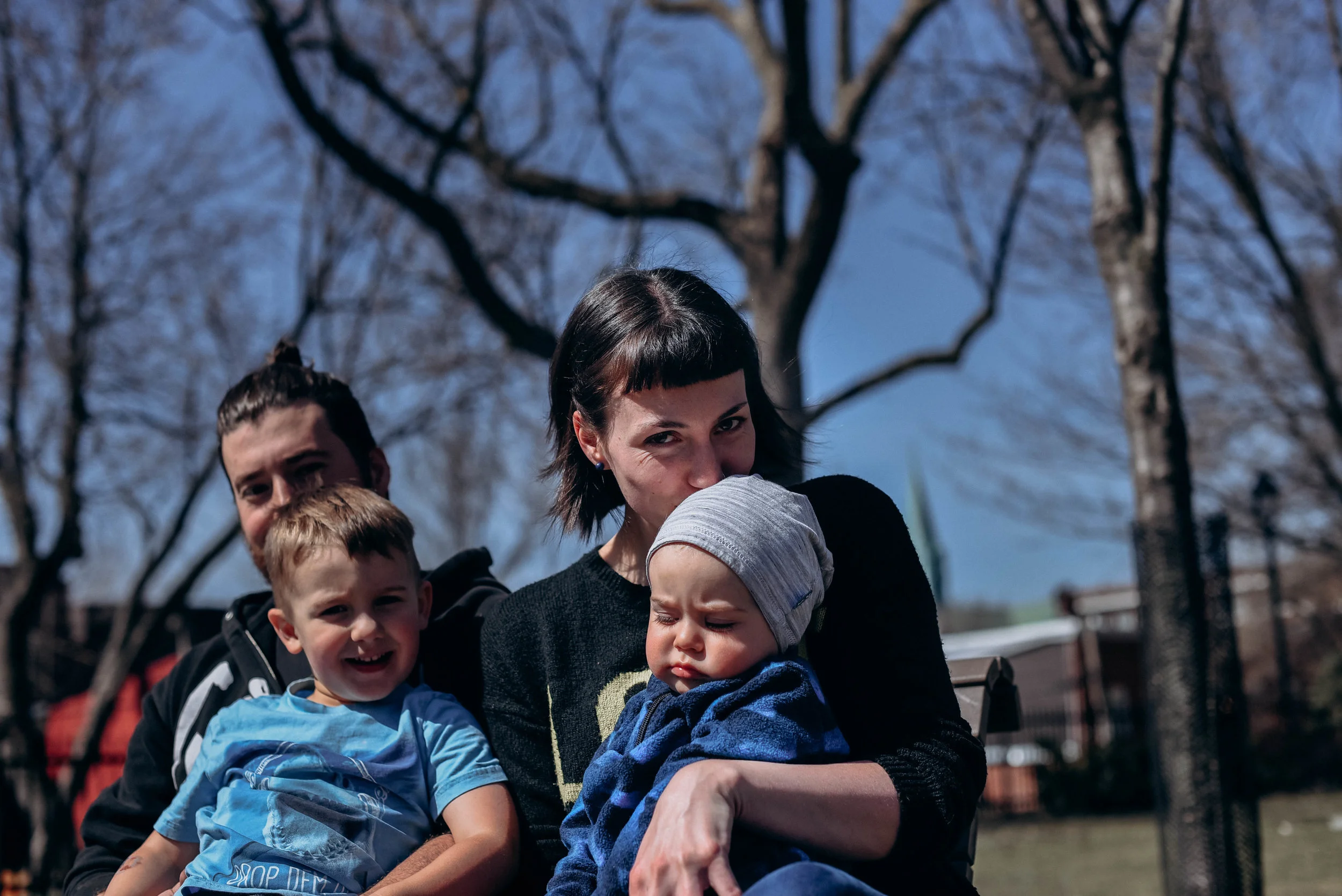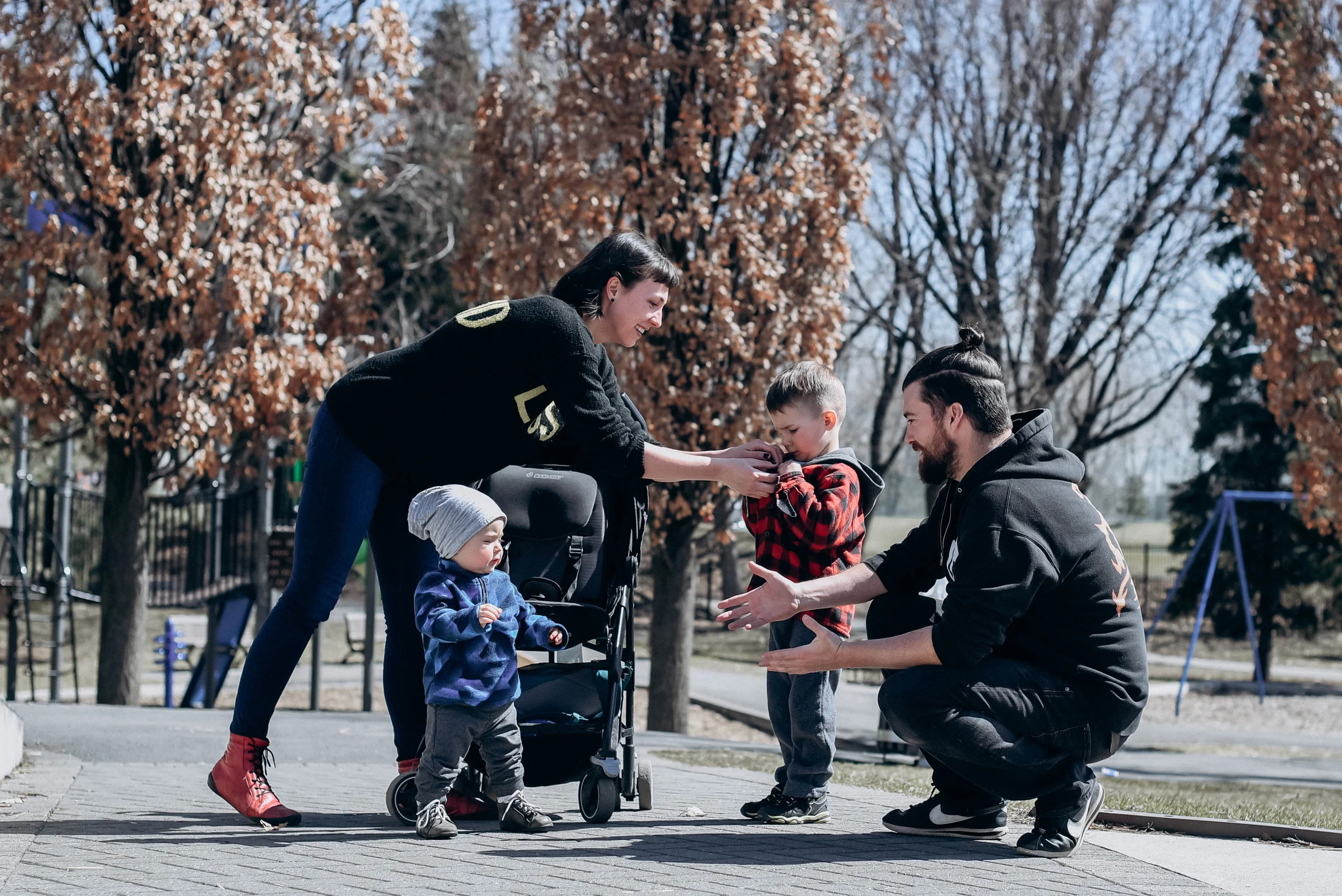Story #30 - Mélissa, Montréal QC (Canada)
Our first son was such an easy baby. Everything with him was fabulous: the pregnancy, the birth, the postpartum. For the first three months, my partner and I were together at home. He’s a seasonal worker and having him around was heaven. I did not change one diaper until six-week postpartum.
He told me: "You breastfeed, you relax, I’m taking care of everything else." I know it was difficult for other moms around me to hear that. Despite the fact we all want involved dads, it’s still quite rare. I was lucky I never had to ask for help. We really enjoyed our time together, as a family.
Our son only started daycare when he was 18 months old. When he turned two, we began trying for another child. I had two miscarriages, so a lot of hormones, trials, and errors. A lot of sadness, too. It was difficult, but I thought, "It happened to others, and now it happens to me. It’s life."
Then one morning my son told me, "Maman, you are pregnant with a sweet little boy!" He didn’t even know we were trying and I didn’t even know I was pregnant. But he was right: I was carrying a little boy, his brother. That pregnancy was fine but harder. I had already started to feel that I wouldn’t be able to give my second child as much as my first. There was a lot of questions. A lot of unknown.
While I was pregnant, our son started to become hypersensitive. Crisis after crisis that lasted hours. I was like, "Oh my God, is it the new baby who causes that? Is it me?" Even before our second was born, I was already drowning in guilt. The last couple of months of my pregnancy were grueling. I tried to rest as much as I could while my partner took care of him, but the symptoms of his hypersensitivity were getting worse. We didn’t know what was going on and how to manage him. We were all lost.
I was five-months pregnant when my doctor put me on bedrest, and I had to stop working. I was drained. I couldn’t walk because my back was killing me. I had to take two baths a day, and I could already sense that this second baby was pushing me out of my comfort zone.
The first time, I had done all this work in preparation for the birth. Not this time. I didn’t have the energy, I didn’t have the strength. I found a group of women who do Red Tent Circles. It’s beautiful. A safe space for women where we all gather in a circle and celebrate womanhood. There, I smoothly settled down and landed back on my feet.
The birth went well. It was smooth and gentle. Completely different than with my first – more intense – but beautiful. He too was easy at the beginning. Slept five hours straight the first month. Breastfeeding took about two weeks. At the same time, I felt unsettled: the family dynamic was already there so I couldn’t solely focus on him. It was a significant adaptation.
Then, at seven weeks old, he had a fever. We went to the Urgent Care. Left with antibiotics for an ear infection. Three days passed, but not the fever. We went to the hospital, and they’re like, "It’s just a virus, go home." Two times like that. On our third visit, I demanded to meet with the ENT doctor. So we did. The word ‘meningitis’ was mentioned, and she told us to go right back to the ER and demand to be admitted.
But the ER physician rejected her diagnosis. At that point, I simply refused to leave. I demanded a lumbar puncture. A mother shouldn’t have to ask for a lumbar puncture. The doctor obliged. Snootily, but he obliged. And I was right. When he gave us the results, he could barely bring himself to say the word "meningitis." He wouldn’t look at me in the eyes.
It took two days of testing to know if it was bacterial, with possible brain lesions and 50% chance of dying, or viral, with no repercussions. We got lucky. Everybody was relieved when they told us it was viral, but the whole experience was draining.
I can still picture myself sleeping on a couch in his room at the hospital, breastfeeding him for almost a week while he was attached to a hundred tubes. He was over eight weeks old when we brought him back home. Then, little by little, he stopped sleeping. We thought it was just a phase, but he kept waking up every two hours.
I quickly spiraled down into exhaustion. I even lost most memories of this time. There were also some difficulties with my family. We fought. I felt I couldn’t get a grip on anything. Then one week, I just couldn’t get out of bed. I cried and cried and cried. Hated everybody, my children included. My partner told me it wasn’t normal, that I should talk to someone.
I mentioned my worries to the pediatrician at my son’s three-month appointment. She’s nice, but she’s young. Automatically she freaked out, said I was going through postpartum depression, and told me, "You go see a therapist or I’m giving you pills." She asked if I wanted to hurt my child. I said no, but I could see the urgency in her eyes, and it scared me so much. I had to reassure her, but I came back home with that. I was frightened.
Mental illness runs in my family. I know my patterns, and I also know that there are grey zones between postpartum depression and what I was going through. I found a therapist who was specialized in family relationships. She was so reassuring. She assessed my symptoms and was like, "Now, let’s calm down: it’s a burnout. You’re exhausted. You don’t sleep, and this is torture. It’s ok to go through postpartum depression, but you’re not there yet. You need to sleep, the baby needs to sleep – everybody needs to sleep! – then we can look at what’s going on and build up from there."
It was such a relief to hear the word "burnout." It’s easier to accept your situation when you have a name for it, and to find solutions: yoga, chiropractor for the baby, training to cope with our hypersensitive child, homeopathy. We tried everything, and we really followed our intuitions. Around seven or eight months old – so many, many months later – our son finally began to sleep better.
Gradually, I allowed myself to live outside the house and away from my children. With the help of good friends, I accepted that our kids have their own path; we are not responsible for fixing their every difficulty. Becoming independent and learning how to deal with your own emotions, this is part of life. When I understood that, it was like a switch went on. I had been told by other parents, but also by professionals that my "bad vibrations" and my stress were affecting my children’s mood. The lack of empathy towards new parents can be hurtful. But I wasn’t screwing up their lives, I was just doing my best!
It also became important to talk about parental burnout. Everybody tells you it’s normal to be exhausted, but there are differences between being tired, going through a burnout, and going through depression: it’s not black or white, and we need to be more educated about the different symptoms. The past year has been really anxiogenic, but life is getting better. And at some point, you have to tell yourself, "You are the mom you are. You’ll get better. You’ll improve. And that is enough."



